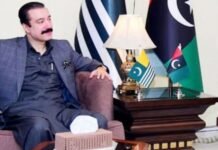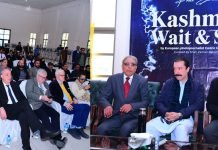Islamabad: The India Study Centre (ISC) at the Institute of Strategic Studies Islamabad (ISSI) hosted the launch of Saud Sultan’s book, Jammu and Kashmir – The Forgotten Narrative: From Distorted Origins to Denied Freedom. The event featured General Zubair Mahmood Hayat, former Chairman of the Joint Chiefs of Staff Committee, as Chief Guest, and Ambassador Sardar Masood Khan, former President of Azad Jammu and Kashmir, as Guest of Honour. Other speakers included Mr. Farooq Rehmani, senior Kashmiri leader and former Convener of the All Parties Hurriyat Conference (APHC) AJK Chapter, and Barrister Daniyal Chaudhry, Parliamentary Secretary for Information and Broadcasting.
In his remarks, Director General ISSI Ambassador Sohail Mahmood described Saud Sultan’s book as a substantial contribution to the historiography of the Jammu and Kashmir dispute, particularly in bridging many long-standing gaps. He noted that the author, who hails from a prominent Kashmiri family in AJK and feels deeply about the cause, approached the subject with objectivity and rigorous research, drawing on archival material, first-hand testimonies, and long-suppressed accounts.
Ambassador Sohail Mahmood outlined five major contributions of the book. First, it comprehensively documents the Jammu Massacre of 1947, in which over 200,000 Kashmiris were killed and 300,000 displaced. The author establishes that the massacre was not a spontaneous outbreak of communal violence but a coordinated operation by Maharaja Hari Singh to alter the region’s Muslim-majority demography, carried out with the support of Patiala Forces, Akali Jathas, Dogra troops, and RSS workers.
Second, the book refutes India’s claim that its military intervention was in response to a “tribal invasion” supported by Pakistan. Instead, the author highlights the local armed rebellion in Poonch and Mirpur, and the establishment of Azad Jammu and Kashmir on 24 October 1947, as key factors. He argues that tribal fighters were invited by locals facing repression from Dogra forces and anticipating India’s military intervention under a plan orchestrated by Home Minister Sardar Patel.
Third, the author asserts that India had already invaded Kashmir before the entry of tribal fighters, with Patiala State Forces and allied groups conducting operations alongside Dogra troops and RSS volunteers. Fourth, it challenges the legality of India’s military intervention, contending that Maharaja Hari Singh had not signed the Instrument of Accession on 26 October 1947, as claimed, prior to the landing of Indian troops in Srinagar on 27 October 1947. Fifth, the book contrasts the freedoms enjoyed in Azad Jammu and Kashmir with the repression faced by Kashmiris in Indian Illegally Occupied Jammu and Kashmir (IIOJK).
Concluding his remarks, Ambassador Sohail Mahmood said that Saud Sultan had challenged a selective and distorted version of history, offered new interpretations of key historical events, and paved the way for further scholarly research and truth-seeking.
Chief Guest General Zubair Mahmood Hayat underscored the critical importance of the narrative surrounding the Jammu and Kashmir dispute, emphasizing that the true story of Kashmir has been deliberately obscured by India. He praised Saud Sultan’s book for presenting definitive evidence that challenges established Indian narratives. The book, he noted, provides irrefutable proof that India invaded Kashmir—not Pakistan—and that Pakistan was wrongfully blamed. It highlights the indigenous nature of the uprising that led to the liberation of areas forming Azad Jammu and Kashmir.
General Hayat elaborated on the author’s revelation of a “quad” of invaders—comprising Patiala State Forces, Akali Sikh Jathas, Dogra troops, and RSS militants—who entered and conducted operations in Jammu and Kashmir before any so-called tribal fighters arrived. He further noted the book’s exposure of historical omissions in India’s complaint to the United Nations, particularly regarding the true scale of the Jammu Massacre, which claimed over 238,000 lives. He contrasted these findings with India’s minimized figures and commended the book for “setting the record straight.” General Hayat also warned against what he termed “Edit Warfare,” a modern form of hybrid warfare through which India manipulates historical narratives.
Ambassador Sardar Masood Khan described Saud Sultan’s work as a vital addition to Kashmir’s historical literature, noting that it fills a major void. He traced the Kashmiri resistance back to the 1830s against the Dogra rulers and highlighted the July 19, 1947 resolution by the Muslims of Jammu and Kashmir to accede to Pakistan. He described the Jammu Massacre as a genocide and pogrom, in which over 238,000 people were killed, drastically reducing the Muslim population in the region. He argued that India had already invaded Kashmir before the arrival of the tribesmen, citing the presence of Indian and princely state forces disguised as civilians. Ambassador Masood Khan stressed that the book’s narrative is essential for informing the international community, particularly in light of the renewed India-Pakistan tensions in May 2025, which have once again drawn attention to the Kashmir issue.
Dr. Khurram Abbas, Director of the ISC, described the book as a valuable scholarly addition with several notable strengths. He emphasized that Saud Sultan relied extensively on Indian references and internationally recognized academics to establish credibility. The inclusion of a foreword by renowned Kashmir scholar Victoria Schofield further enhances the book’s academic significance.
Author Saud Sultan stated that his principal contribution was to directly challenge and correct the official narrative India presented to the United Nations in 1948. He rejected the Indian claim that Pakistan sent tribesmen on 22 October 1947, prompting the Maharaja to sign the Instrument of Accession on 26 October, leading to India’s military landing on 27 October. He argued that the Instrument of Accession was never signed on 26 October, a conclusion supported by British historian Alastair Lamb, proving that India had no legal basis for its military intervention.
Barrister Daniyal Chaudhry remarked that Saud Sultan’s book effectively reconstructs the “forgotten narrative” of Jammu and Kashmir and explains the origins of the current dispute. He noted that the conflict stemmed from the forcible occupation of the region and condemned the atrocities committed during the Jammu Massacre—an episode largely unknown to younger generations.
The event concluded with a vote of thanks by Ambassador Khalid Mahmood, Chairman of the Board of Governors, ISSI.
Also read:PSW and Sybrid Launch “Khizer” AI Chatbot to Revolutionize Trade Facilitation in Pakistan







